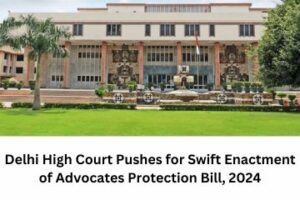If Fraudulent Affairs Of Company Are Continuing, Right To Seek Winding Up Becomes Recurring: Supreme Court In Antrix-Devas Case
Case: Devas Multimedia Private Ltd vs Antrix Corporation Ltd and another
Coram: Justice Hemant Gupta and Justice V Ramasubramanian
Case No.: Civil Appeal No.5766 Of 2021
Court Observation: “Therefore, the way in which the requirement of advertisement has been viewed by Courts is that advertisement causes more harm to the company than the benefit that it brings to the company. Hence the argument of the appellant in this case that the failure to advertise the petition was prejudicial to their interest,goes contrary to one of the important purposes of the advertisement and the chilling effect that it is supposed to have on the company.”
“It may be seen from Subrule (1) of Rule 35 that the procedure laid down in Rule 35 is applicable to cases “where any application, petition or reference is required to be advertised.” The requirement to advertise a petition for winding up does not flow out of the statute, but flows out of the Rules. Since the requirement to advertise a petition for winding up is stipulated in Rules 5 and 7 of the Companies (Winding up) Rules, 2020, what is prescribed in Rule 35 would cover even petitions for winding up. 7.28 If so understood, Subrules (5) and (6) of Rule 35 of the NCLT Rules 2016 would throw light upon the controversy on hand. Subrule (5) makes it clear that even in cases where the direction of the Tribunal as regards advertisement has not been complied with, the Tribunal has an option (i) either to dismiss the petition; or (ii) to give such further directions as it may think fit. Subrule (6) confers power upon the Tribunal even to dispense with any advertisement.”
“The above decisions show that limitation is not always akin to a lighted matchstick to a train of gun powder. The date of commencement of the period need not necessarily be static. The date of commencement may keep changing depending upon the acts of omission and commission on the part of the party against whomthe action is initiated. These acts of omission and commission constitute the bundle of facts, which determine the question whether an action is barred by limitation or not.”
“The main departure of the Companies Act, 2013 from statutory regime of The Companies Act, 1956 is specific inclusion of fraud ‘directly’ as a circumstance in which a Company could be wound up [See, Section 271 of 2013 Act, as it now stands after 2016]. Section 271(c) of The Companies Act, 2013 covers three circumstances for winding up: (i) affairs of Company being conducted in a fraudulent manner; (ii) Company was formed for fraudulent and unlawful purpose; and (iii) persons concerned in formation and management of its affairs have been guilty of fraud, misfeasance or misconduct in connection. A singular act of omission or commission may constitute fraud and even a series of acts may constitute fraud”
“As rightly pointed out by the Tribunal, a singular act of omission or commission may constitute fraud and even a series of acts may constitute fraud. A fraudulent act may be different from the fraudulent manner in which an act is performed. The words “the conduct of the affairs of a company in a fraudulent manner” indicate that the process was a continuing one. If the conduct of the affairs of the company in a fraudulent manner is a continuing process, the right to apply becomes recurring.”
“obviously Antrix cannot lead evidence to show the nonexistence or nonavailability of those things, either by oral evidence or by subjecting their officials to crossexamination by Devas. Devas never produced before the Tribunals any device nor did they demonstrate the availability to Devas services. All that Devas wanted was, the crossexamination of the officials of Antrix. Any amount of crossexamination of the officials of Antrix could not have established the existence of something that was disputed by Antrix.”
“It will be clear from the above sequence of events that (i) despite NCLT not disposing of the impleadment petition before passing final orders; and (ii) despite NCLT dismissing the impleadment petition along with the main company petition, their objections to the main company petition have been dealt, along with the objections of the exDirector of the company in liquidation. In other words, the objecting shareholder had an effective hearing before NCLT. Though their appeal was rejected by NCLAT on the ground of maintainability, their arguments for opposing the winding up, which were just the same as that of the company, have been considered. Therefore, the objection that an opportunity was not given to the shareholders, is just theoretical, when in fact they were heard.”
“the appellants cannot take advantage of the use of an inappropriate expression by NCLAT. The detailed findings recorded by the Tribunal show that they are final and not prima facie. Merely because NCLAT used an erroneous expression those findings cannot become prima facie.”
“this argument is to be rejected outright, in view of the fact that the claims of Devas and its shareholders are also on the property of the Government of India. The space segment in the satellite proposed to be launched by the Government of India, is the property of the Government of India. In fact, the shareholders have secured two awards against the Republic of India under BIT. Therefore, it is neither a lis between two private parties nor a private lis between a private party and a public authority. It is a case of fraud of a huge magnitude which cannot be brushed under the carpet, as a private lis.”
” under the 2013 Act there are two different routes for winding up of a company on allegations of fraud. One is under Section 271(c) and the other is under the just and equitable clause in Section 271(e), read with Section 224(2) and Section 213(b). What was Section 439(1)(f) read with Section 243 and Section 237(b) of the 1956 Act, have now taken a new avatar under Section 224(2) read with Section 213(b). It is only in the second category of cases that the report of the investigation should precede a petition for winding up.”
” If as a matter of fact, fraud as projected by Antrix, stands established, the motive behind the victim of fraud, coming up with a petition for winding up, is of no relevance. If the seeds of the commercial relationship between Antrix and Devas were a product of fraud perpetrated by Devas, every part of the plant that grew out of those seeds, such as the Agreement, the disputes, arbitral awards etc., are all infected with the poison of fraud. A product of fraud is in conflict with the public policy of any country including India. The basic notions of morality and justice are always in conflict with fraud and hence the motive behind the action brought by the victim of fraud can never stand as an impediment.” “We do not know if the action of Antrix in seeking the winding up of Devas may send a wrong message, to the community of investors. But allowing Devas and its shareholders to reap the benefits of their fraudulent action, may nevertheless send another wrong message namely that by adopting fraudulent means and by bringing into India an investment in a sum of INR 579 crores, the investors can hope to get tens of thousands of crores of rupees, even after siphoning off INR 488 crores.”
Previous Posts
Cryptic & Casual Bail Orders Without Relevant Reasons Liable To Be Set Aside: Supreme Court
NCLT Must Pass Reasonable Order For Fees & Expenses Of Resolution Professional: Supreme Court
Dismissal Of An Earlier Section 482 CrPC Petition Does Not Bar Filing Of Subsequent Petition If Facts So Justify: Supreme Court Download Judgement




